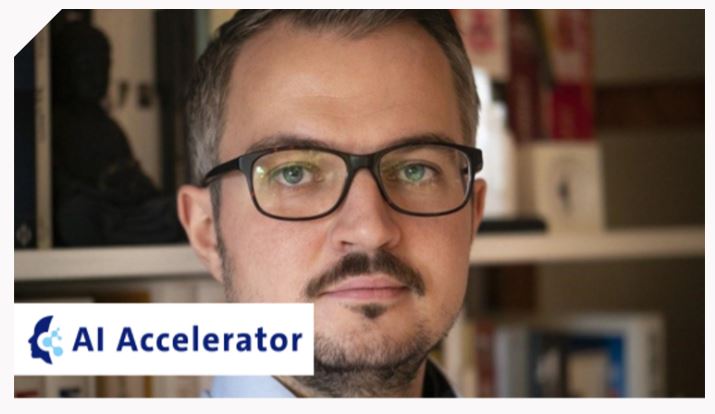Gennady was interviewed by Agora (Erasmus MC intranet) about scientific discoveries and AI to improve healthcare. He introduced our BIGR and his Research focus & collaborations including AI Accelerator

Below is the english translated version of the original article on Agora.
Gennady’s work and vision are driving forces in the integration of AI at Erasmus MC. His journey to Erasmus MC began in 2014 when he moved from Russia to the Netherlands to pursue a PhD in imaging genetics and algorithm development. With a background in astrophysics and computer science, Gennady was drawn to the complexity of biological problems and decided to work in healthcare. “By working in healthcare, you can make a scientific discovery and potentially help people”, he says. And although he initially struggled to convince colleagues of the benefits of using data and algorithms, he now works closely with various departments and organizations on this. A true pioneer in the use of AI at Erasmus MC!
BIGR: a unique research group
During his PhD, Gennady joined the Biomedical Imaging Group Rotterdam (BIGR), founded by his promotor at the time (Wiro Niessen). BIGR is a unique research group with multiple Principal Investigators (PIs) working on machine learning, AI, and image analysis. Gennady now plays a key role in business development, focusing on collaborations with industry to turn research into practical applications. He works closely with the Technology Transfer Office and Rotterdam Square, actively monitoring AI developments within the BIGR group to identify potential spin-off opportunities or industry collaborations. An example is the skin cancer risk prediction model, which gained attention from SkinVision. In addition, he is involved in the scientific supervision of startup companies, including Dutch startup OASYS NOW, which recently secured a €1 million investment after being recognized as the best startup in Europe. “In healthcare, we need to collaborate more with the industry. AI models should be made available on the market. Otherwise, it’s just the papers”, he emphasizes.
Research focus and collaborations
Gennady is enthusiastic about the intersection of AI and genomics, with the goal of developing solutions that benefit patients. He also holds an appointment in the Epidemiology department, which deepens his expertise in study design, population health metrics, and real‑world data interpretation—skills that are critical for developing and validating AI models that truly reflect disease patterns in diverse communities.
“One of my current studies involves integrating different types of omics data — like genetics and epigenetics — using AI algorithms and distributed learning”, Gennady explains. This kind of research requires close collaboration with national and international partners to access diverse datasets, including patient records, genetic information, and data from population-based cohorts and biobanks. “By combining these types of data, we can detect risk factors at an early stage and better focus on prevention or treatment”, he explains.
When it comes to data such as patient records, it’s important to handle privacy with great care. To share patient data between hospitals or countries, Gennady uses federated learning. This is a technique that enables AI models to learn from decentralized datasets without moving or exposing the data.
For others interested in this field, he highlights the importance of collaboration, open science, and building bridges between data, clinicians, and technology experts. “We’re only beginning to uncover what’s possible when we connect the dots across disciplines”, he adds.
Want to know more about Gennady’s work? Listen to his recently started podcast, called: ‘The Lifelong Study – Insights from Rotterdam’ about the Rotterdam Study. Click here to listen.
Establishing AI-community SquAIre
In 2023, Gennady co-founded SquAIre with two colleagues (Ihor Smal and Devika Narain). This initiative aimed to connect people within Erasmus MC who were interested in AI. “Machine learning became popular and it seemed everyone wanted to do something with it. Me and my colleagues then connected on the idea to work bottom-up”, Gennady says. They started organizing educational events and an online community.
SquAIre now has 500 members but managing it can be a challenge. Gennady: “There are different needs and knowledge levels in the community, we see different requests and different topics being discussed. Some want to learn, some want to start a project. Don’t get me wrong, that is great, but difficult to manage. For the future of the community, I think it’s good that the needs of the community will be facilitated.” In the near future, the SquAIre community will become part of the AI Accelerator community. Members of SquAIre will be notified about this change soon.
Approach AI implementation with both caution and flexibility
Gennady sees great potential for AI in healthcare, but he also acknowledges the challenges. He believes that a conservative mindset sometimes prevails in the medical field. “Caution is important—we’re dealing with patients. Safety and precision are essential”, Gennady says. “But at the same time, this mindset can also slow down progress.”
According to Gennady, Erasmus MC has a clear advantage thanks to its structured organization and access to large, rich datasets. “We have so much data—it just needs to be better organized”, he explains. “Departments should have the autonomy to lead their own digital transformations. After all, they usually know best what they need.” Gennady emphasizes, however, that this can only succeed if there is a clear vision from the leadership. “The organization must provide direction and allocate resources to support departments in this process. That way, data at Erasmus MC can be better structured, and AI can be more easily implemented in our daily work.”
AI Accelerator
Fortunately, such leadership is beginning to take shape. Earlier this year, Erasmus MC launched the AI Accelerator, an initiative designed to fast-track the responsible implementation of AI in healthcare. One of its core missions is to provide the kind of clear vision and infrastructure Gennady advocates for, while also nurturing a strong, collaborative AI community.